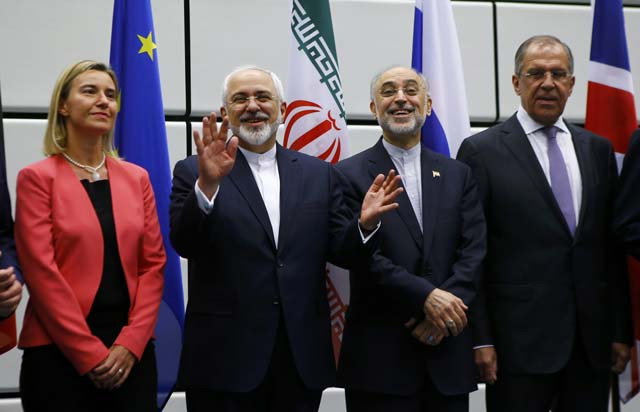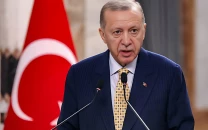A changing world
If Iran and the US can do a deal, reach a compromise, then so can India and Pakistan

Iranian Foreign Minister Mohammad Javad Zarif (2nd L) gestures next to High Representative of the European Union for Foreign Affairs and Security Policy Federica Mogherini (L), Iranian ambassador to IAEA Ali Akbar Salehi (2nd R) and Russian Foreign Minister Sergey Lavrov (R) as they pose for a family photo in Vienna, Austria 14 July, 2015. PHOTO: REUTERS
In return, billions of dollars of Iran’s frozen assets are to be released and sanctions are to be progressively eased — with a ‘snap back’ clause if there is any backsliding. Quite predictably, Israel has reacted negatively to the historic development, calling the deal a mistake, and the American Republicans are of similar voice. President Barack Obama, however, was having none of this, saying he would veto any move by the Republicans to derail the deal.
The Arab world is not enchanted either and some commentators have speculated on the possibility of Saudi Arabia now seeking nuclear parity with Iran. Arab states are in something of a limbo, caught up in the battle in Yemen (where Iran is accused of running a proxy sectarian war) and they have nothing beyond oil to bring to the table. Oil prices are dropping like a stone; alternative sources of oil are emerging and alternatives to oil itself increasingly establishing themselves. Old certainties are fading.
Iran remains implacably belligerent towards Israel and there is no shortage of areas of cognitive dissonance surrounding the deal, but one of the great logjams of modern geopolitics has finally begun to give way. The reason why it is giving way is because the time was right for it to do so, and there is something in the deal for all the signatories, albeit in very different ways.
For Iran, there is what it sees as a restoration of its dignity among other intangible benefits, and for a nation where these things matter, that is no small advance. Iran sees itself as taking its place in the world once more, finally free of the shackles of sanctions, a shaking off of a past dominated by America — only to sign up for a future that is no less dominated by America, but with a different playbook. Iran has emerged as a tough player in a tough neighbourhood, not exactly everybody’s friend, but no longer the universal enemy it was stereotypically perceived to be.
For the Western nations, there is the possibility of entering an investment market that has been closed for 30 years and targeting a population that is young, well educated and hungry for the wares potentially on offer. They understand that prosperity is not coming at the flick of a switch, but there is a hope on the horizon that was not there a week ago.
Pakistan shares a long land border with Iran and has a basket of common interests, with energy at the top of the list. Iran urgently needs to sell energy; Pakistan urgently needs to buy it and an easing of the sanctions regime may remove the Damoclean sword of sanctions against Pakistan if the Iran-Pakistan gas pipeline project can be completed. The deal has been warmly welcomed in Islamabad and in practical terms, the infrastructure could be completed relatively quickly.
The deal took two years of bitterly contested negotiation to get to the point it has, and came close to breaking down on several occasions according to John Kerry, the American secretary of state. The key to getting there in the end came down to a single word — compromise. In that single word lies the key to the resolution of our own unhappy relationship with India. If Iran and the US can do a deal, reach a compromise, then so can India and Pakistan. Everything is possible and nothing is forever.
Published in The Express Tribune, July 16th, 2015.
Like Opinion & Editorial on Facebook, follow @ETOpEd on Twitter to receive all updates on all our daily pieces.




1725099588-0/BeFunky-(41)1725099588-0-208x130.webp)














COMMENTS
Comments are moderated and generally will be posted if they are on-topic and not abusive.
For more information, please see our Comments FAQ